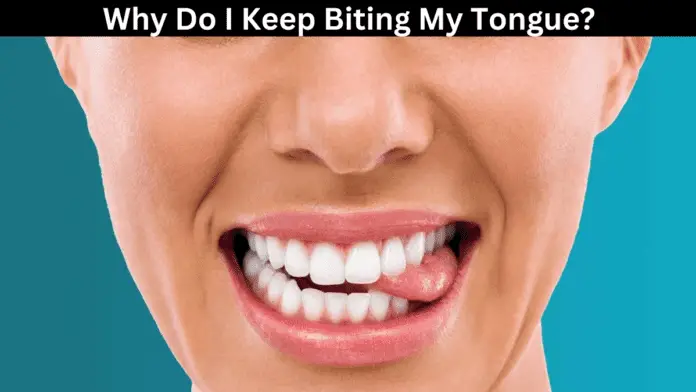
If you’ve ever wondered, “why do I keep biting my tongue?“, you’re not alone. Tongue biting is a common problem that affects many people, causing discomfort and frustration. In this comprehensive guide, we’ll explore the various reasons behind this pesky habit, backed by scientific research and expert insights. We’ll also provide tips on how to prevent tongue biting and answer some frequently asked questions on the topic.
1. Accidental Tongue Biting
Accidental tongue biting is perhaps the most common reason people ask, “why do I keep biting my tongue?” It usually occurs while eating or talking and may result from distraction or carelessness. Studies have shown that the tongue occupies a large portion of the oral cavity and moves rapidly during speech and mastication, making it susceptible to injury1.
2. Sleep Bruxism and Tongue Biting
Sleep bruxism, or teeth grinding, is another possible cause of tongue biting. According to the American Sleep Association, approximately 10% of adults and 15% of children experience sleep bruxism2. People with this condition may unconsciously clench their jaw and grind their teeth during sleep, leading to tongue biting. In some cases, sleep bruxism may be related to stress, anxiety, or an abnormal bite3.
3. Oral Health Issues
Oral health issues, such as misaligned teeth or dental appliances, can also contribute to tongue biting. For example, people with crowded or crooked teeth may have a higher risk of accidentally biting their tongue during chewing or speaking4. Similarly, those who wear braces, dentures, or retainers may experience irritation and discomfort, leading to tongue biting.
4. Stress and Anxiety
Stress and anxiety are often linked to tongue biting. Research has shown that stress can cause various oral health problems, including teeth grinding, jaw clenching, and tongue biting. People under stress may unconsciously bite their tongue as a coping mechanism or habit. In some cases, tongue biting can become a form of self-harm known as dermatophagia.
5. Neurological Disorders
In rare cases, neurological disorders may be the reason behind persistent tongue biting. Conditions such as Tourette’s syndrome, epilepsy, or tardive dyskinesia can cause involuntary muscle movements, including tongue biting. If you suspect that a neurological disorder may be causing your tongue biting, consult a healthcare professional for proper evaluation and treatment.
Prevention Tips
To prevent tongue biting, consider the following tips:
- Eat slowly and mindfully: Focus on your food and avoid distractions while eating to reduce the chance of accidental tongue biting.
- Address oral health issues: Consult a dentist to address any dental problems, such as misaligned teeth or poorly fitting dental appliances.
- Manage stress and anxiety: Practice relaxation techniques, such as deep breathing, meditation, or yoga, to help alleviate stress and reduce tongue biting.
- Seek professional help: If you suspect that a neurological disorder may be causing your tongue biting, consult a healthcare professional for proper evaluation and treatment.
Home Remedies for Tongue Biting Relief
If you’ve bitten your tongue, there are several home remedies you can try to alleviate pain and promote healing:
- Rinse with saltwater: Dissolve half a teaspoon of salt in a glass of warm water and gently swish it around your mouth for 30 seconds before spitting it out. Repeat this process a few times a day to help reduce inflammation and prevent infection.
- Apply a cold compress: Hold a cold compress or ice pack wrapped in a thin cloth against the affected area for a few minutes at a time to help numb the pain and reduce swelling.
- Take over-the-counter pain relievers: Non-prescription pain relievers, such as ibuprofen or acetaminophen, can help alleviate pain and reduce inflammation. Be sure to follow the manufacturer’s instructions and consult a healthcare professional if you have any concerns.
- Avoid spicy or acidic foods: These types of foods can irritate the injured area, so stick to bland, soft foods until your tongue has healed.
Read Also: Why Does My Jaw Hurt When I Wake Up?
FAQs
Q: Why do I keep biting my tongue while eating?
A: Accidental tongue biting while eating is common and can result from distraction or carelessness. To prevent this, try to eat slowly and mindfully, focusing on your food and avoiding distractions.
Q: Can stress cause tongue biting?
A: Yes, stress can cause various oral health problems, including teeth grinding, jaw clenching, and tongue biting. People under stress may unconsciously bite their tongue as a coping mechanism or habit.
Q: How do I stop biting my tongue at night?
A: If you’re experiencing tongue biting at night due to sleep bruxism, consider using a mouth guard to protect your tongue and teeth. You can also try relaxation techniques before bedtime to help reduce stress and promote a more restful sleep.
Q: Can tongue biting be a symptom of a more serious condition?
A: In rare cases, persistent tongue biting may be a symptom of a neurological disorder, such as Tourette’s syndrome, epilepsy, or tardive dyskinesia. If you suspect that a neurological disorder may be causing your tongue to bite, consult a healthcare professional for proper evaluation and treatment.
Conclusion
In conclusion, there are several reasons why people may keep biting their tongue, ranging from accidental occurrences to stress-related habits or even neurological disorders. By understanding the possible causes and implementing preventive measures, you can reduce the frequency of tongue biting and improve your overall oral health.
Resources:
- Tongue movements in speech: The utterance of Sibilant and Non-sibilant fricative consonants – ScienceDirect
- Sleep Bruxism – American Sleep Association
- Teeth Grinding (Bruxism): Causes and Treatments – WebMD
- The relationship between incisal/occlusal wear, dentin hypersensitivity, and tongue lesions – NCBI











